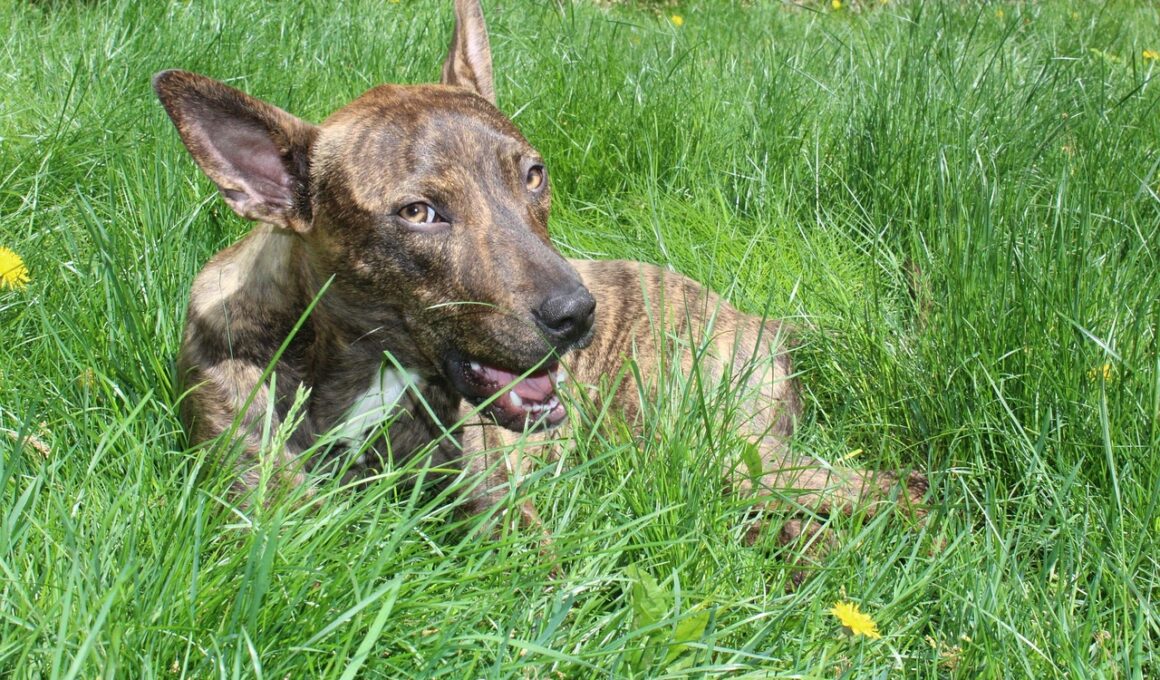Overcoming Anxiety: Helping Rescue Dogs Adapt in Their New Homes
Adopting a rescue dog is a profoundly rewarding experience but often comes accompanied by challenges, especially concerning anxiety. Many rescue dogs have faced trauma, neglect, or abandonment which can lead to anxiety in unfamiliar environments. Once you bring your new furry friend home, being attentive to their behavior is of utmost importance. Early signs of anxiety may include excessive barking, hiding, or loss of appetite. Understanding these signals helps you create a safe space for them, easing their transition. Being patient and positive is essential for your new dog to build trust. Fostering a calm atmosphere with gentle interactions might lead to reducing anxiety levels. Regular routines for feeding, walking, and playtime will give your dog much-needed structure, which can also alleviate their stress. Gradually introducing them to new experiences and environments helps them adapt without feeling overwhelmed. Remember, every dog is different, and it may take time. Therefore, consistently monitoring their behavior and adjusting your approach is key to a successful transition. It’s vital for both the dog and the owner to stay committed to fostering a nurturing environment during this crucial period.
Building a safe haven for your rescue dog involves creating a zone where anxiety triggers can be minimized. Providing an inviting atmosphere can make a significant difference in your dog’s adaptation process. One of the first steps you can take is to designate a specific area in your home as your pet’s safe space. This place should contain all their essentials such as food, water, and toys, providing comfort. Additionally, soft bedding or a cozy crate can enhance their feelings of security. Some dogs may prefer cozy corners or quiet rooms, while others might thrive in busier areas of the house. Also, consider using calming aids like anxiety wraps, pheromone diffusers, or soothing music designed for dogs. These can help reduce stress levels substantially. Remember that the goal is to allow them to explore at their own comfort level. Striking the right balance between gentle encouragement and respecting their boundaries is vital. Listening to your dog’s needs through body language and behavior will guide you in creating a safe haven tailored to their preferences and needs throughout this adjustment phase.
Establishing a Routine
Routines provide dogs with structure and predictability, significantly aiding in their adaptation. A consistent daily schedule helps your new rescue dog understand what to expect, which can be incredibly comforting. Start by sticking to regular feeding times, walking schedules, and playtimes to establish consistency. Knowing when they will eat or go for a stroll promotes a sense of security in their new environment. Additionally, allocate time each day for training exercises to build their confidence gradually. Short training sessions using positive reinforcement make learning enjoyable and rewarding for your dog. Incorporating mental stimulation through puzzle toys or interactive games is also crucial for reducing anxiety. Daily challenges help keep their minds engaged, preventing boredom and anxiety from arising. Furthermore, leash training is beneficial. Taking short walks initially while gradually increasing their exposure to the outside world can help your dog adjust. Ensure to reward them during walks or new encounters to encourage positive associations. Establishing a routine not only aids in adjusting your dog but reinforces your bond, creating a harmonious living environment for both of you.
Socialization is an essential aspect of helping your rescue dog overcome anxiety, especially regarding interactions with other dogs and people. Exposing your new pet to various settings, people, and creatures is crucial for building confidence. Starting slowly is key; allow your rescue dog to observe from a distance, gradually decreasing the space as their comfort grows. Socializing them in controlled environments, like training classes, with friendly dogs enhances their confidence levels. Structured interactions can help them learn proper behavior in social settings. However, note your dog’s reactions and provide supportive reassurance if they exhibit fear or hesitance. Consider environments that have a calm, comforting atmosphere ensuring that they don’t feel overwhelmed. Positive experiences during these interactions encourage a sense of belonging and ease anxiety. Engaging with other dog owners can provide support and shared experiences that prove helpful during the adjustment period. Your encouragement and positive reinforcement every time they handle socialization well will reinforce desirable behaviors while alleviating their fears. Socialization truly plays a crucial role in enabling your rescue dog to adapt effectively and enrich their lives with positive experiences.
Patience and Understanding
Caring for a rescue dog requires patience and a deep understanding of their unique journey. Each dog comes with a distinct history, and the effects of prior experiences may linger. Building trust is essential, and this will take time, especially if they’ve been neglected or mistreated. Your rescue dog might display fearful behaviors like cowering, barking, or avoiding contact initially. Being patient, avoiding loud actions, and providing reassurance through gentle interactions can encourage their sense of safety. Approach your dog without forcing physical contact; let them initiate it at their own pace. Try engaging them with toys or treats to create positive associations. Recognizing triggers that cause anxiety—whether they stem from loud noises or sudden movements—allows you to create a more accommodating environment. Celebrate their small victories, recognizing their progress in adapting. Each new experience builds their confidence, reinforcing the bond you share. Understanding and respecting their emotional state while adapting training techniques will significantly help overcome the deeply ingrained anxieties they may hold.
Another vital aspect of assisting rescue dogs in adjusting to their new home involves employing professional help when necessary. Consulting with a certified dog trainer or behaviorist can provide tailored approaches for specific anxiety issues. They can assess your dog’s behavior and recommend suitable training techniques, creating interactive strategies addressing your dog’s unique needs. Positive reinforcement methods are always preferred over punitive approaches. Through structured guidance, you and your dog can engage in activities that promote confidence and reduce anxiety. Additionally, participation in dog training classes with other dogs can enrich social interactions and reinforce appropriate behaviors. Environments with experienced instructors provide safe settings for your dog to practice newly learned skills. If anxiety is severe, consulting a veterinarian may introduce medications to assist during the transition period. Medical advice can complement behavioral interventions, enabling your rescue dog to cope better with their new environment. Your commitment and proactive measures in seeking professional help significantly enhance your dog’s transition, ensuring they feel secure and loved at home while curbing their anxieties in a supportive manner.
Celebrating Achievements
Celebrating even the smallest achievements in your rescue dog’s adaptation process is crucial in encouraging their growth. Whether they take their first steps in their new home or explore new areas of the garden, acknowledgment fosters a positive mindset. Create milestones, tracking their progress in overcoming fears or learning new skills. Each time your dog engages in social settings or displays relaxed behavior, take a moment to celebrate! Simple praises such as treats, belly rubs, or extra playtime can reinforce desirable behaviors and celebrate your pet’s hard work. Additionally, sharing these moments with your friends or family allows your dog to receive ample attention and appreciation from various people, which helps build their enjoyment. Regularly documenting their progress through videos or photos not only serves as motivation but also tracks how far they have come. Celebrating achievements additionally encourages you in this journey, reminding you of the rewarding experiences that come from adopting a rescue dog. Adopting a dog is not merely about providing shelter; it’s about creating a lasting bond founded on trust and understanding.
The journey of helping rescue dogs overcome anxiety is one filled with devotion, understanding, and gentle encouragement. Every rescuer, adoptive parent, or trainer plays a crucial role in shaping these dogs’ futures, ensuring that they don’t just find a home but a loving and safe environment. By acknowledging the challenges faced by rescue dogs, we can foster a society that understands their emotional needs and provides necessary support. With time, patience, and the right strategy, you can help rescue dogs transition into their new homes gracefully. Building a relationship based on trust and constant communication enhances their likelihood of thriving beyond anxiety, embracing the new love and happiness that comes from a caring family. Remember to remain active in providing them with opportunities to learn and grow. Your efforts in nurturing these beautiful souls transform lives, creating bonds that last a lifetime, beneficial for both the dog and owner. You’ll not only witness their progress but also the immeasurable joy that a happy pet brings into your life, filled with affection, loyalty, and companionship that enriches everyday experiences.


